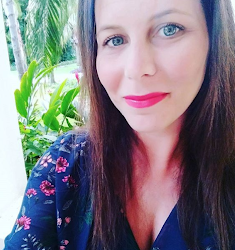I gave a presentation on Elizabeth Gilbert in a magazine writing class in university. This was just years, more likely months, before she released Eat, Pray, Love, the memoir that launched her into the homes of women (and surely, some men) around the world. My presentation was on literary non-fiction, and it touched on this amazing tidbit: Elizabeth Gilbert wrote the 1997 GQ article "The Muse of the Coyote Ugly Saloon," which inspired the movie that any girl who came to age in the early "aughts" knows well. I also spoke about her book The Last American Man, a book that introduced me to literary non-fiction, the genre I enjoy above all others.
I mention all this to say that I've been a fan of Elizabeth Gilbert for many years, so I couldn't wait to read Big Magic: Creative Living Beyond Fear, her most recent work of non-fiction.
Gilbert writes early in the book:
"So this, I believe, is the central question upon which all creative living hinges: Do you have the courage to bring forth the treasures that are hidden within you?"
Big Magic is full of advice and anecdotes for creators of all disciplines. If you don't have time to read the book, I wholeheartedly suggest you listen to Gilbert on q with Shad.
I tend to jot down a lot of quotes when I read, and I found myself adding sticky notes to almost every chapter in Big Magic. I've compiled a few of my favourite nuggets of wisdom below.
Elizabeth Gilbert on Writing Life ...
"Most of my writing life consists of nothing more than unglamourous, disciplined labor. I sit at my desk and I work like a farmer, and that's how it gets done. Most of it is not fairy dust in the least."
On Schooling ...
"Instead of taking out loans to go to a school for the arts, maybe try to push yourself deeper into the world, to explore more bravely. Or go more deeply and bravely inward. Take an honest inventory of the education you already have — the years you have lived, the trials you have endured, the skills you have learned along the way."
On Education, Not to be Confused with Schooling ...
"Your teachers don't even need to be alive to educate you masterfully. No living writer has ever taught me more about plotting and characterization than Charles Dickens has taught me — and needless to say, I never met him during office hours to discuss it. All I had to do in order to learn from Dickens was to spend years privately studying his novels like they were holy scripture, and then to practice like the devil on my own."
On Children ...
"They never seemed to worry that the flow of ideas would dry up. They never stressed about their creativity, and they never competed against themselves; they merely lived within their inspiration, comfortably and unquestioningly."
On Disappointment ...
"I remember thinking that learning how to endure your disappointment and frustration is part of the job of a creative person. If you want to be an artists of any sort, it seemed to me, then handling your frustration is a fundamental aspect of the work — perhaps the single most fundamental aspect of the work. Frustration is not an interruption of your process; frustration is the process."
On Money ...
"Money helps, to be sure. But if money were the only thing people needed in order to live creative lives, then the mega-rich would be the most imaginative, generative, and original thinkers among us, and they simply are not. The essential ingredients for creativity remain exactly the same for everybody: courage, enchantment, permission, persistence, trust — and those elements are universally accessible."
On Perfectionism ...
"Perfectionism stops people from completing their work, yes — but even worse, it often stops people from beginning their work. Perfectionists often decide in advance that the end product is never going to be satisfactory, so they don't even bother trying to be creative in the first place."
On Suffering ...
"I want to make something perfectly clear here: I do not deny the reality of suffering — not yours, not mine, not humanity's in general. It is simply that I refuse to fetishize it. I certainly refuse to deliberately seek out suffering in the name of artistic authenticity."
On Why Your Art isn't Your Baby ...
"Your creative work is not your baby; if anything, you are its baby. Everything I have ever written has brought me into being. Every project has matured me in a different way. I am who I am today precisely because of what I have made and what it has made me into."
On Curiosity ...
"I believe that curiosity is the secret. Curiosity is the truth and the way of creative living. Curiosity is the alpha and the omega, the beginning and the end. Furthermore, curiosity is accessible to everyone."
"I believe that curiosity is the secret. Curiosity is the truth and the way of creative living. Curiosity is the alpha and the omega, the beginning and the end. Furthermore, curiosity is accessible to everyone."
On Failures ...
"Whatever you do, try not to dwell too long on your failures. You don't need to conduct autopsies on your disasters. You don't need to know what anything means. Remember: The gods of creativity are not obliged to explain anything to us. Own your disappointment, acknowledge it for what it is, and move on. Chop up that failure and use it for bait to try to catch another project."


